- Home
- Joan Lowery Nixon
The Ghosts of Now Page 2
The Ghosts of Now Read online
Page 2
Mom looks as though I’d said I was running a fever. “Why did you eat by yourself?”
“Because I’m going to be taken on a tour of Fairlie.” It comes out with a giggle.
They’re staring at me, waiting for me to explain, when the doorbell rings. Naturally, Jeremy reaches the door first. “It’s Boyd!” he yells and flings it wide. I wish he weren’t so eager. Mom and Dad don’t seem to notice, but I do, and it hurts.
But it isn’t Boyd. Del steps through the door, pulling off the kind of broad-brimmed, high-crowned felt western hat I’d seen a lot of around Fairlie. He’s even better-looking than I’d remembered, and I know if Meredith were here she’d groan and say, “Why’d you have to find him first?” He sticks out his right hand and shakes Jeremy’s, saying “Howdy. I’m Del Scully.”
Jeremy’s mouth is open. “Howdy—uh—hi,” he stammers.
Dad’s tall, but Del looks down on him a couple of inches as I introduce him to my parents. “Welcome to Fairlie,” Del tells them.
“Thank you,” Dad says. He’s very much the poised executive and studies Del as though he’s applied for a job. “Won’t you sit down?” he asks.
“That’s mighty nice of you to ask,” Del tells him, “but I want to show Angie around Fairlie before the sun goes down.”
“I’d like to get better acquainted, to learn something about you and your family,” Dad says.
But Del just grins again. “That would take hours and hours. Y’all will hear about us some day when we can stretch out our legs and take plenty of time.”
At first I think he’s matching Dad cool for cool, but then I realize Del’s just being open and honest. He doesn’t know that Dad’s maneuvering to take command.
Mom hasn’t said much. She just smiles kind of weakly and says, “Well, do have a nice drive.” She walks with us to the front door and takes a long look at Del’s dark blue pickup with the dent in the right front fender; her perfectly matched eyebrows get somewhat out of alignment.
“I’ll take good care of Angie, and bring her home about ten,” Del tells them. He takes my elbow and steers me down the steps, the walk, and into the front seat of his pickup truck.
As he drives away from the curb I say, “I’ve been wondering what there is to see in Fairlie.”
“I’m going to show you some things that will make you feel more at home here,” Del says.
At first I don’t believe him, but I change my mind. Because what Del shows me are people. He gives me stories, not statistics; minds, not monuments.
He drives to an older part of town, where the blocks are lined with huge, brick homes set well back from the street. “This is old Judge Wallaby’s house,” he says, as he slows by a white-brick corner home. “The judge had a daughter whose husband just seemed to go loco and beat that little woman something awful. So she ran home to her daddy, and when the husband came after her, the judge got down his rifle and shot him dead. Shot right through that front door.”
“How awful. Did the judge go to prison?”
“Nope. Nobody blamed him. It didn’t even get to the grand jury.”
“You mean because it was self-defense?”
“Well, sure, but also because Judge Wallaby’s family helped settle this part of West Texas and build Fairlie. That son-in-law wasn’t even from around these parts.”
He drives to a huge yellow monstrosity on the next street, where it dead-ends near a gully. Overgrown, dusty shrubbery twists with scraggly trees in a tattered screen that hides much of the house. Here and there a window appears like an unblinking glass eye. “That’s the Andrews place. Miz Andrews had so much money she didn’t know what to do with it all, and after she died eight years ago every cousin and kin who ever heard her name wanted it.”
“But the house looks empty. Don’t any of her relatives live in it?”
“Maybe some of them will after the court finally settles things. Until then nobody wants to live there except the ghost.”
I turn to stare at him, but he looks serious.
“I’m not kidding. Something moves around in there at night. The neighbors have heard it. And they’ve seen flickering lights.”
“Have you?”
“Nope. But we might go looking sometime.”
We drive until the sun explodes into scarlet shatters across an orange-streaked sky and drops beyond the flat horizon, and I hear about the people who fought the dust storms to raise cattle and scratch out farmland and cluster together in neighborhoods until one day they formed a town. Oil was discovered and Fairlie expanded, with two country clubs and twenty Baptist churches and four indoor shopping malls and all the people who kept the whole thing running.
We stop at a brick building that looks purple in the garish green light from the neon sign over the door. Inside are guys and girls in jeans and cowboy hats, and lots of them look our age. Country-western music is blaring from the juke box, and a few couples are dancing close, elbows out, feet doing a fast shuffle. Some of the kids call out to Del, and he grins back at them, at the same time gripping my right elbow again and steering me in a zigzag course into a chrome and plastic chair. He hooks the heel of his boot into the spindly leg of another chair, dragging it to a spot next to mine. While I’m busy staring around the room, a waitress slaps down two large colas.
“This is where I like to hang out,” Del says. He’s watching me to see how I’ll react. Will it matter to him? This is a strange world to me, and I feel a little apart from it. But there’s something I like about it. At the moment I wouldn’t mind belonging.
“It’s nice.” I lean back in my chair, relaxing, and smile at him.
The question in his eyes slides from the corners into laugh crinkles. He puts a hand over one of mine and says, “I’d like you to meet some of my friends.”
“Okay.”
“But not now. Tonight I want to find out about Angie Dupree.”
It’s easy to tell him about the girls’ school in Los Angeles where I met Meredith, and about the fun we had together, and the surfing at Malibu and the window-shopping in Beverly Hills and the classes at the county art museum on Wilshire. But it was another planet. It was another Angie. Here, in Fairlie, Texas, a country-western singer nasally wails for a lost love, and Del’s fingers are warm and strong.
He sits up, shoving back his chair with a screech along the wooden floor. “Quarter to ten,” he says. “Time to get you home.”
“It’s still early.” I don’t want to go.
“I said ‘ten’ to your daddy. Let’s get moving.”
It’s been a strange evening. Everything from haunted houses to country music, with a guy who seems to belong in an old-fashioned western TV show. As we drive back to my home I ask myself if this makes me like living in Fairlie any better. Maybe, for the moment. But that other world is waiting. One year, and I’ll be back.
There’s a low, black sports car parked in front of our house. Del says, “Looks like you’ve got company.” He walks me to the front door, says “See you tomorrow, Angie,” turns, and leaves.
I don’t know what I expected, but this wasn’t it. What’s with this cowboy’s code? Doesn’t he kiss girls good night? I might not have kissed him anyhow. But at least he could have tried!
I shut the front door a little harder than I mean to. The voices in the living room stop, so I hurry to let them know it’s just me, and not a door-slamming burglar.
Happiness is a golden gleam in Jeremy’s eyes. “Angie, this is Boyd Thacker.”
Everyone in the room smiles with the same pleased expression. Everyone but Boyd. For a few moments his appraisal of me is penetrating and unblinking. Then he smiles with a polished charm that matches his dark good looks as he says “You’ve got a beautiful sister, Jeremy.”
I don’t say anything, so Mom giggles and says, “We agree.”
And Dad asks me, “How was your little sightseeing tour?” Not waiting for an answer, he turns to Boyd and says, as though it’s a private joke, “Angie seems
to have found an honest-to-goodness cowboy.”
“Kicker,” Jeremy says with authority. He looks at Boyd. “I think they got that name because of the boots.”
Boyd doesn’t respond. He’s still staring at me. He’s not much taller than I am and almost as thin as Jeremy. There shouldn’t be anything menacing about a person like that. But the intense look in his eyes makes me think of a snake hypnotizing a bird. I shudder.
“That air conditioning must be blowing right on you,” Mom says. “Come in here and sit down. It’s pleasant in here.”
So I perch on the end of the chair closest to my mother and wonder why I’m the only one who feels that there’s something very wrong about Jeremy’s small, dark-eyed friend.
CHAPTER TWO
After a few minutes of very dull conversation Boyd mutters something about stuff he has to do. Jeremy, trailing Boyd like an adoring puppy, goes out with him to admire his car. “Boyd’s sixteen,” he says, with the same awe reserved for someone who’s just won the Indianapolis 500.
The door shuts, and Dad says, “His father’s an attorney. I’ve heard of him. Very influential in Fairlie.”
“Wow!” I say. “That makes him practically perfect, just like Mary Poppins.”
Mom, who has been busy plumping up the cushions on the satin-striped sofa, straightens and stares at me. “I don’t understand the sarcasm, Angie. Boyd seems like a nice boy to me.”
“I think he’s a creep,” I answer. “And I don’t think what his father does for a living makes any difference.”
Dad leans back in his chair, making a church steeple of his fingers and resting his chin on them. He does this a lot when he’s having what he calls “an important talk” with Jeremy or me, and I think it’s because there’s a dimple in his chin that quivers when he gets upset about anything, and this way he can cover the dimple and not give his feelings away. I bet he does that in his office too.
“Many young people are idealists,” Dad says, “so I don’t fault you for that, Angie. But as you grow older and become more experienced with the ways of the world, you’ll find that a man’s position in life does make a difference.”
“A difference in what?”
His lips turn up in the barest of smiles. “Don’t you think that an attorney would command more respect than—let’s say—a cowboy?”
Sometimes I like to get into a good argument with my father, and we sharpen our wits against each other as though they were little knives, darting, pricking, slicing—but never very deeply. Tonight I’m not in the mood, so I say, “That’s a hard question. Perry Mason versus The Lone Ranger. I’ll have to give that one a lot of thought.”
I get up and stretch, yawning loudly with my mouth wide open, knowing that will irritate Dad too.
The door bangs and Jeremy’s in the room. “Angie, that’s some kicker you came up with. He’s a nice guy, though. I’d like a hat like his, except I couldn’t wear it, because people would think I was trying to be a kicker. Does he ride a horse?”
“Probably,” I answer. “We didn’t talk much about him. He just asked a lot of questions about me.”
“You just talked about yourself all that time? You sure are conceited!”
I throw a punch toward his shoulder, and he jumps out of the way, grinning. “I didn’t just talk about myself. Del told me a lot of neat stuff about the people who built this town, and showed me things, like the house with ghosts in it.”
Jeremy perks up. “Real ghosts?”
“How can ghosts be real when they’re unreal? No one believes in ghosts.” I turn to Mom and Dad and add, “Del told me some of the history of this town.”
My mouth is open, ready to share some of the stories, but Jeremy interrupts. “Boyd was only here about twenty minutes, but I’m glad he came, so all of you could meet him. He’s real popular at school. We’re going to get in some extra practice at the courts at the country club. They’re better than the courts at school, Boyd says.”
I don’t want to hear another word about Boyd, so I blow kisses to my parents and say, “Good night. I’m going to read over my French assignment in bed.”
Mom comes to hug me and murmurs, “That cowboy is good-looking, dear. I’m sure he’ll be just the first of lots of good-looking boys you’ll meet here.”
Subtle as a cement truck. I dutifully kiss her cheek, then head for my room. Later, it’s hard to concentrate on French. I find myself smiling at memories of the evening, until I give up, slide under the covers, and turn out the light. And for the first time in weeks I’m able to fall asleep.
For the next few days I study during most of my spare time. I’ll be at USC in less than a year. Nothing’s going to stop me.
It’s good to see Del every morning. He talks to me about his family, and he asks about mine. I find myself telling him things I haven’t thought about for years, like when I was six and learned how to swim, then tried to teach Jeremy in the bathtub. And the time I wanted to visit Grandma; so I packed my favorite doll and a jar of peanut butter, took Jeremy by the hand and set out on a journey that ended at the police station, where we got cherry lollipops. Maybe because Del’s got such an easy way about him, maybe because he never seems to be pretending like most people do, I feel comfortable with him. I think I’m beginning to trust him.
He asks me for a date for Saturday night. “You need to learn country-western dancing,” he says. “And I’m the one who can teach you.”
“How about disco?” I ask. “Can you dance disco?”
He shrugs. “Sure. But it’s nicer up close.”
I find out that Jeremy was right about Boyd being popular. He’s one of the class officers and a good student, and he keeps that charm going strong. Even the teachers like him.
“Hi, Angie,” he beams at me as we pass in the hallway.
I mumble something, a little embarrassed that I don’t like him. I seem to be the only one who distrusts that charm, and maybe I’m wrong.
A couple of the girls in my classes begin to talk to me. Both of them have fathers with oil companies, but they’ve moved here years ago and feel so comfortably settled that they can talk about Fairlie like smug mothers reciting the adorable faults of their children.
“Wait till you find yourself in a sandstorm,” one of them says. “It’s awful. It blows through the cracks in the windows and gets on everything.”
“Even in your teeth,” the other says, her braces flashing. “And it howls—the wind that is.”
“When are the sandstorms?”
“The wind will start soon. I know it always blows down our Christmas decorations every year.”
“But the sand blows in the spring. And it goes on and on until you want to scream.”
Later I ask Del about it.
“Just parts of Oklahoma wanting to come down to Texas,” he says. “It’s not as bad as it used to be before there was so much planted. The early farmers had it bad.”
It isn’t that great now, I think, and I wonder why anyone wanted to try to grow things in hard, dry, desert country like this. Not a lake or a river as far as the horizon. The town’s an oasis, with spreading gray-leafed oaks like giant straws, sucking up moisture from deep below the dusty surface of the earth.
I’m paired with Debbie Hughes for a few moments during basketball practice in P.E. We’ve passed each other dozens of times in the halls and going in and out of classes, but this is the first time she’s actually looked at me. It’s an appraisal. She’s sizing me up as though I were competition. Surely, not for Debbie Hughes. We’re not even in the same world.
She drives a pale blue foreign car, and I’ve never seen her alone in it. I’ve never seen her alone anywhere. Even when she sweeps down the school hallways, she’s in the middle of giggles and gush.
A whistle blows, a ball comes fast, and that’s it. Not a word spoken. In a few minutes she’s back with her own group. I don’t care about Debbie. I don’t care about any of them. I only care about Meredith and USC and the life I’m g
oing to have next year.
Mom joins a study club and signs up for season tickets to the community theater. She goes to a couple of luncheons at the country club and once can’t make it to dinner. “Tell your father I may have a virus,” she mumbles and skips the coffee to sleep it off.
I don’t think Dad’s dense. I think he has too much on his mind to notice things he ought to notice. He works long hours, brings home stacks of papers to read, and occasionally grumbles to Mom about problems with his job.
“There’s a lot of antagonism against the oil people in certain quarters here,” he says to Mom. “It occasionally adds unnecessary problems.”
Mom just shrugs and says, “Cash in hand is always the bottom line, isn’t it?”
“I wouldn’t want someone else to be getting the mineral profits from my land. I know how those people feel.”
“We’re just innocent bystanders,” Mom tells him. “Why should they get mad at us?”
I start to tell them about the way it is at school, with people divided into groups, with the ones like Debbie calling themselves “socialites,” and the kickers, and the kids of the oil company people, but Dad sort of looks over my shoulder and murmurs “Um-hum” every once in a while, so I know he’s not listening. His body’s home, but his mind is off somewhere else.
Jeremy comes and goes, usually with a tennis racket under his arm. He’s out a lot in the evenings, and I’m surprised that’s okay with Mom and Dad, but if they don’t care, then why should I? Sometimes Jeremy’s quiet and keeps to himself, and sometimes he rattles on and on about a lot of stuff, but I don’t usually listen. It’s not important. And I’ve got to catch up in French. He’s stopped talking about Boyd Thacker so much, and that’s a relief.
So the days crumble into another Friday, and that’s when it’s bad. On Fridays Meredith and I were usually together. Sometimes we’d double date, or make popcorn and watch the late late movie.
This Friday evening I’m alone.
Mom and Dad are going out to dinner with some company brass who’ve flown in from the Houston office. She stoops to kiss me good-bye. “I’ve left the number of the club by the phone in the den, if you need us,” she says. She’s wearing red silk and looks terrific.

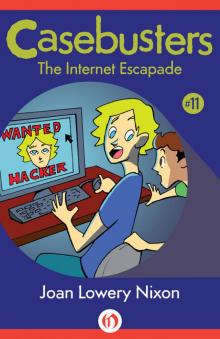 The Internet Escapade
The Internet Escapade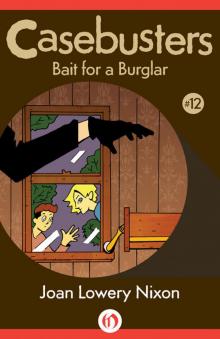 Bait for a Burglar
Bait for a Burglar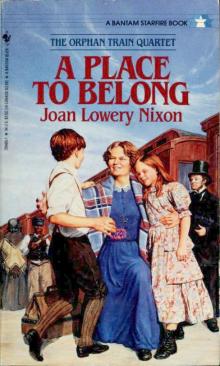 A Place to Belong
A Place to Belong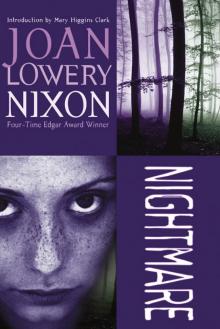 Nightmare
Nightmare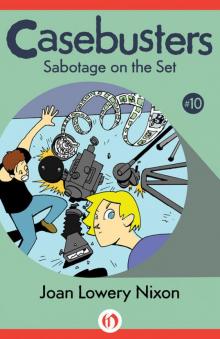 Sabotage on the Set
Sabotage on the Set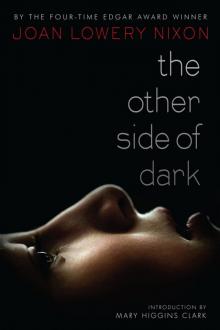 The Other Side of Dark
The Other Side of Dark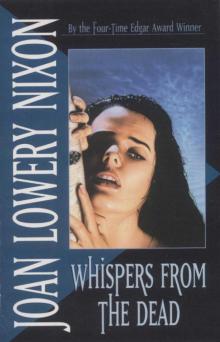 Whispers from the Dead
Whispers from the Dead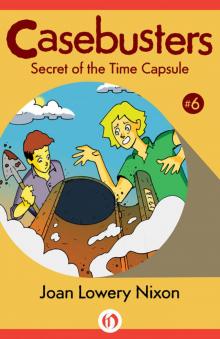 Secret of the Time Capsule
Secret of the Time Capsule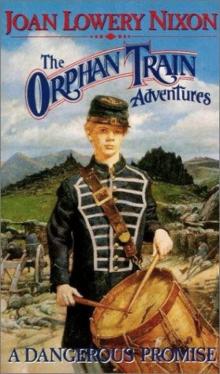 A Dangerous Promise
A Dangerous Promise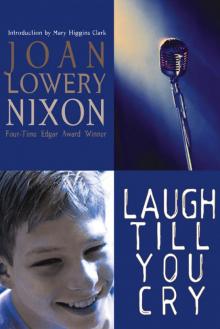 Laugh Till You Cry
Laugh Till You Cry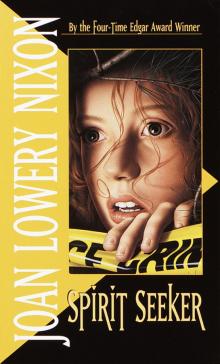 Spirit Seeker
Spirit Seeker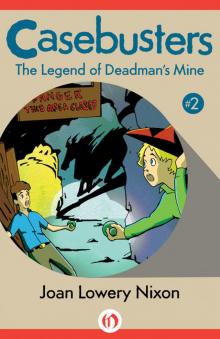 The Legend of Deadman's Mine
The Legend of Deadman's Mine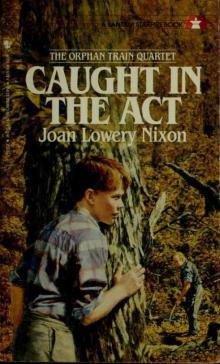 Caught in the Act
Caught in the Act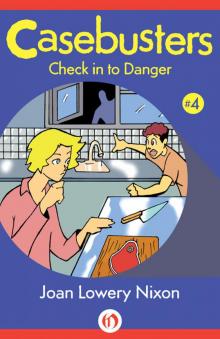 Check in to Danger
Check in to Danger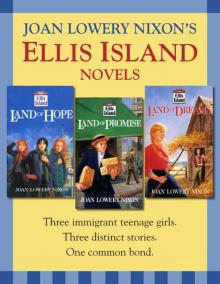 Ellis Island: Three Novels
Ellis Island: Three Novels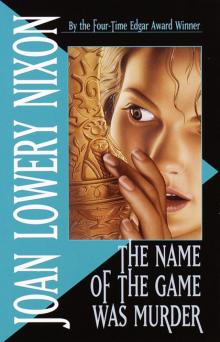 The Name of the Game Was Murder
The Name of the Game Was Murder The Haunting
The Haunting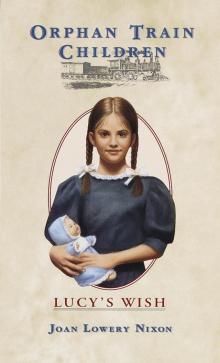 Lucy’s Wish
Lucy’s Wish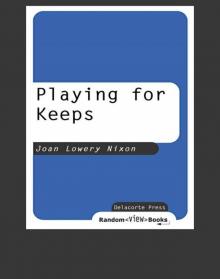 Playing for Keeps
Playing for Keeps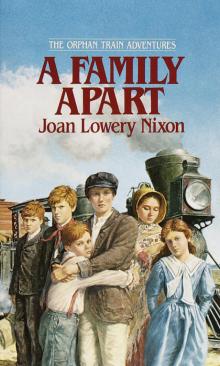 A Family Apart
A Family Apart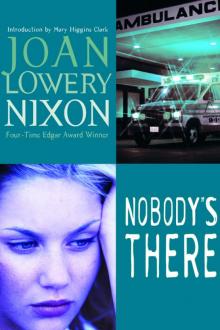 Nobody's There
Nobody's There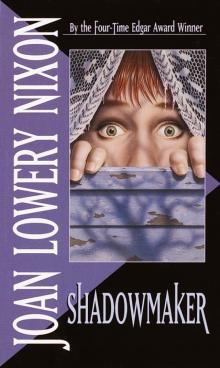 Shadowmaker
Shadowmaker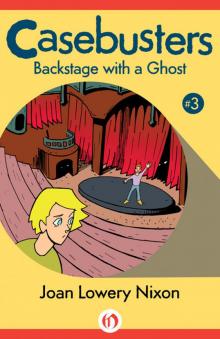 Backstage with a Ghost
Backstage with a Ghost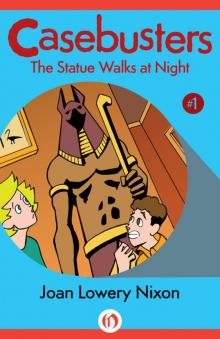 The Statue Walks at Night
The Statue Walks at Night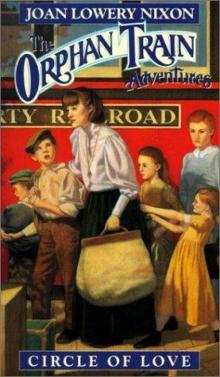 Circle of Love
Circle of Love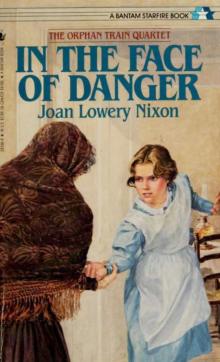 In the Face of Danger
In the Face of Danger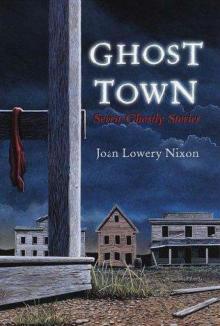 Ghost Town
Ghost Town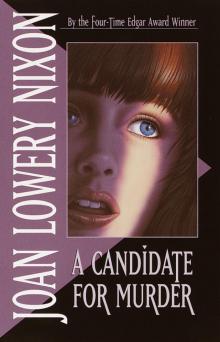 A Candidate for Murder
A Candidate for Murder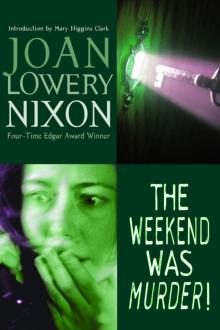 The Weekend Was Murder
The Weekend Was Murder The Island of Dangerous Dreams
The Island of Dangerous Dreams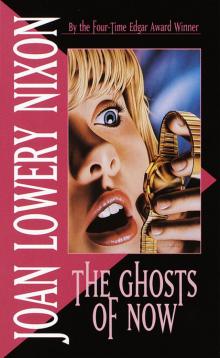 The Ghosts of Now
The Ghosts of Now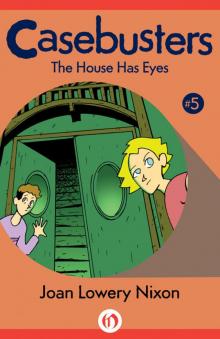 The House Has Eyes
The House Has Eyes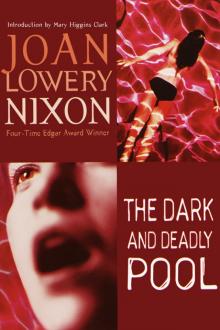 The Dark and Deadly Pool
The Dark and Deadly Pool Keeping Secrets
Keeping Secrets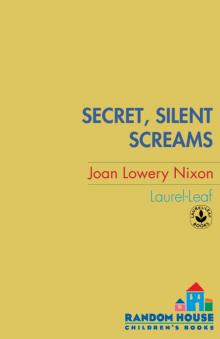 Secret, Silent Screams
Secret, Silent Screams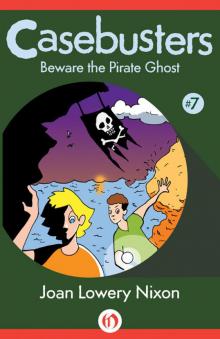 Beware the Pirate Ghost
Beware the Pirate Ghost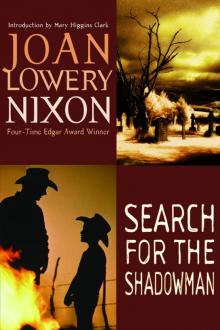 Search for the Shadowman
Search for the Shadowman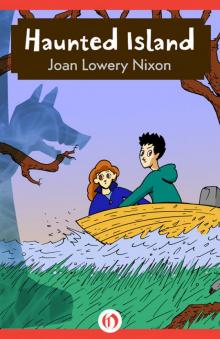 Haunted Island
Haunted Island